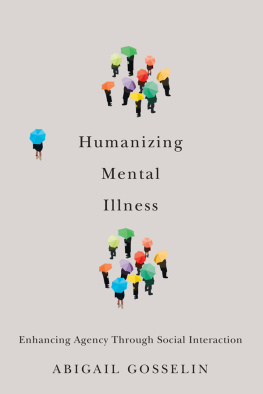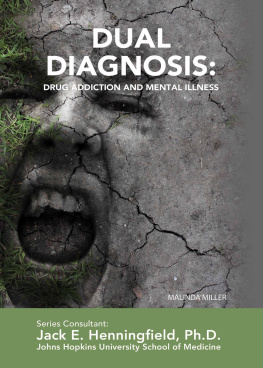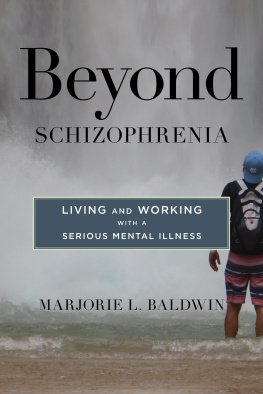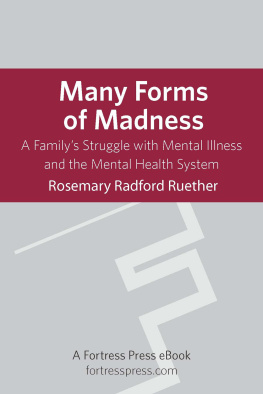HUMANIZING MENTAL ILLNESS
Humanizing Mental Illness
Enhancing Agency
through Social Interaction
ABIGAIL GOSSELIN
McGill-Queens University Press
Montreal & Kingston London Chicago
McGill-Queens University Press 2021 ISBN 978-0-2280-06787 (cloth) ISBN 978-0-2280-06794 (paper) ISBN 978-0-2280-07340 (ePDF) ISBN 978-0-2280-07357 (ePUB) Legal deposit third quarter 2021 Bibliothque nationale du Qubec Printed in Canada on acid-free paper that is 100% ancient forest free (100% post-consumer recycled), processed chlorine free Library and Archives Canada Cataloguing in Publication Title: Humanizing mental illness: enhancing agency through social interaction/Abigail Gosselin. Names: Gosselin, Abigail, 1977 author. Description: Includes bibliographical references and index. Identifiers: Canadiana (print) 20210183047 | Canadiana (ebook) 20210183101 | ISBN 9780228006787 (cloth) | ISBN 9780228006794 (paper) | ISBN 9780228007340 (ePDF) | ISBN 9780228007357 (ePUB) Subjects: LCSH: Mental illnessSocial aspects. | LCSH: Mental illness Public opinion. | LCSH: Mentally illSocial conditions. | LCSH: Mentally illPublic opinion. | LCSH: Stigma (Social psychology) | LCSH: Agent (Philosophy) Classification: LCC RC455. G67 2021 | DDC 362.2/042dc23 This book was typeset by Marquis Interscript. |
To Deborah and Marc Gosselin
Acknowledgments
I want to thank first and foremost my editor, Khadija Coxon, who supported me every step of the way. The success of this project is due partly to her.
Thank you to Jason Taylor, Karen Adkins, Ted Zenzinger, Becky Vartabedian, Anandita Mukherji, Ron DiSanto, Julia Brumbaugh, Fred Gray, and Nick Kallan for friendship and encouragement and for being amazing colleagues. Thank you to Tom Bowie and Janet Houser for workplace support.
Thank you to John Romeo, Dr Samuel Clinch, and Ethan Selvig for putting me back together after my recent bout with psychosis. As you can see, I have learned a lot from you. Thank you to Dr David Weiss, Dr Michael Weitzner, and Bex Baker for helping me through past mania and depression.
Thank you to Derrick, Rhea, and Phoebe for everything. I could not have done it without you.
An earlier version of chapter 1 appeared in Social Philosophy Today. See Abigail Gosselin, Mental Illness Stigma and Epistemic Credibility, Social Philosophy Today 34 (2018): 7794.
List of Abbreviations
ACT | acceptance and commitment therapy |
ADHD | attention deficit/hyperactivity disorder |
APA | American Psychiatric Association |
CBT | cognitive behavioural therapy |
DBT | dialectical behavioural therapy |
DSM, DSM-IV,
and DSM-5 | Diagnostic and Statistical Manual |
ICD | International Classification of Diseases |
OCD | obsessive-compulsive disorder |
RFT | relational frame theory |
WHO | World Health Organization |
HUMANIZING MENTAL ILLNESS
Introduction
What I rather wish to say is that the humanity we all share is more important than the mental illness we may not. With proper treatment, someone who is mentally ill can lead a full and rich life. What makes life wonderful good friends, a satisfying job, loving relationships is just as valuable for those of us who struggle with schizophrenia [and other mental illnesses] as for anyone else.
Mental illness is a major problem throughout North America and worldwide. This is evident when we look at United States statistics. According to the US Centers for Disease Control and Prevention, 50 per cent of Americans will be diagnosed with a mental disorder in their lifetime, while 20 per cent of Americans are diagnosed with a mental disorder within a given year.
Almost everyone is impacted by mental illness, either directly or indirectly. Many people are personally affected by mental illness, whether they experience it themselves or have family members or close friends who do. Nearly everyone is impacted in a society in which a third of all homeless people in the US have mental illness and about half of all US inmates do. Mental illness is both a personal issue, touching the lives of many families, and a social issue, as people with mental illness comprise a disproportionate amount of the populations that are homeless or imprisoned.
While there is greater public awareness of mental disorders than ever before, certain stigmas remain high due to beliefs that people have about mental illness and to fears about the impact mental illness has over a persons life. When people close to us have mental illness, we tend to worry about them and care about them; we often fear what their illness will do to them and sometimes fear the illness and even the person themselves. When we hear about public figures having mental illness, we might think their illness sums up their behaviour, or we might be derisive of them for not being able to hold their lives together, or we might not believe them if we think they are using their illness as an excuse. When we hear that a person needs accommodations for their mental illness, we might wonder whether they really need the accommodations or if they are gaming the system. When we encounter people we do not know who appear to have mental illness, such as homeless people or people making a disturbance in public, we are more likely to fear not only the illness but also the person who has the illness. We easily reduce people to the trait that we fear or feel disgusted by and we ignore everything else about their identity. We erase their particularity so they are no longer individuals to us. We treat them as less than us, or as the Other. When we stigmatize people, we dehumanize them.
Stigma of mental illness is understandable. We fear mental illness for good reasons, as mental illness creates mental impairments that constrain our agency. Having agency is arguably what characterizes us as human. Reasoning capacities, free will, and subjective awareness are all necessary for agency, yet any of these can potentially be compromised by mental illness. Mental impairments that constrain our agency thereby threaten our sense of ourselves as human. We fear for good reason the cognitive, rational, affective, and volitional impairments mental illness causes.
Nonetheless, our fear of mental illness worsens the situation for people who actually have mental illness. In fearing mental illness, we stigmatize people who have such illness. People with mental illness already have constrained agency due to the mental impairments their illness causes. When people are subject to stigma, this stigma further constrains their agency by preventing them opportunities to engage in social practices crucial for exercising agency. Stigma leads to social exclusion. The shunning, prejudice, and discrimination involved in stigma results in excluding people from social activities and from social life as a whole. Stigma obstructs people with mental illness from being recognized by others as members of the moral community, as moral agents with moral identities. When we exclude people from our social practices, we do not recognize them as moral equals, as having something valuable to offer, as being like us.
This book has two primary aims. One is to increase understanding of the way mental illness symptoms and stigma work together to constrain peoples agency, primarily by increasing social isolation. Understanding how peoples agency is diminished helps us interact with them more intentionally and productively to increase their agency. Part 1 addresses the first aim of the book by analyzing both direct and indirect ways that mental illness constrains agency. Chapter 2 examines some of the impairments in moral reasoning that result directly from mental illness symptoms and the ways that these impairments can lead people to make bad choices and carry out bad actions (by which I mean harmful to self or others). For example, mental illness can impair moral reasoning by shifting moral boundaries so that right and wrong no longer make sense, by unduly narrowing or widening the range of plausible reasons for action and the scope of options available to a person, and by creating an unorthodox context for valuation.
Next page





